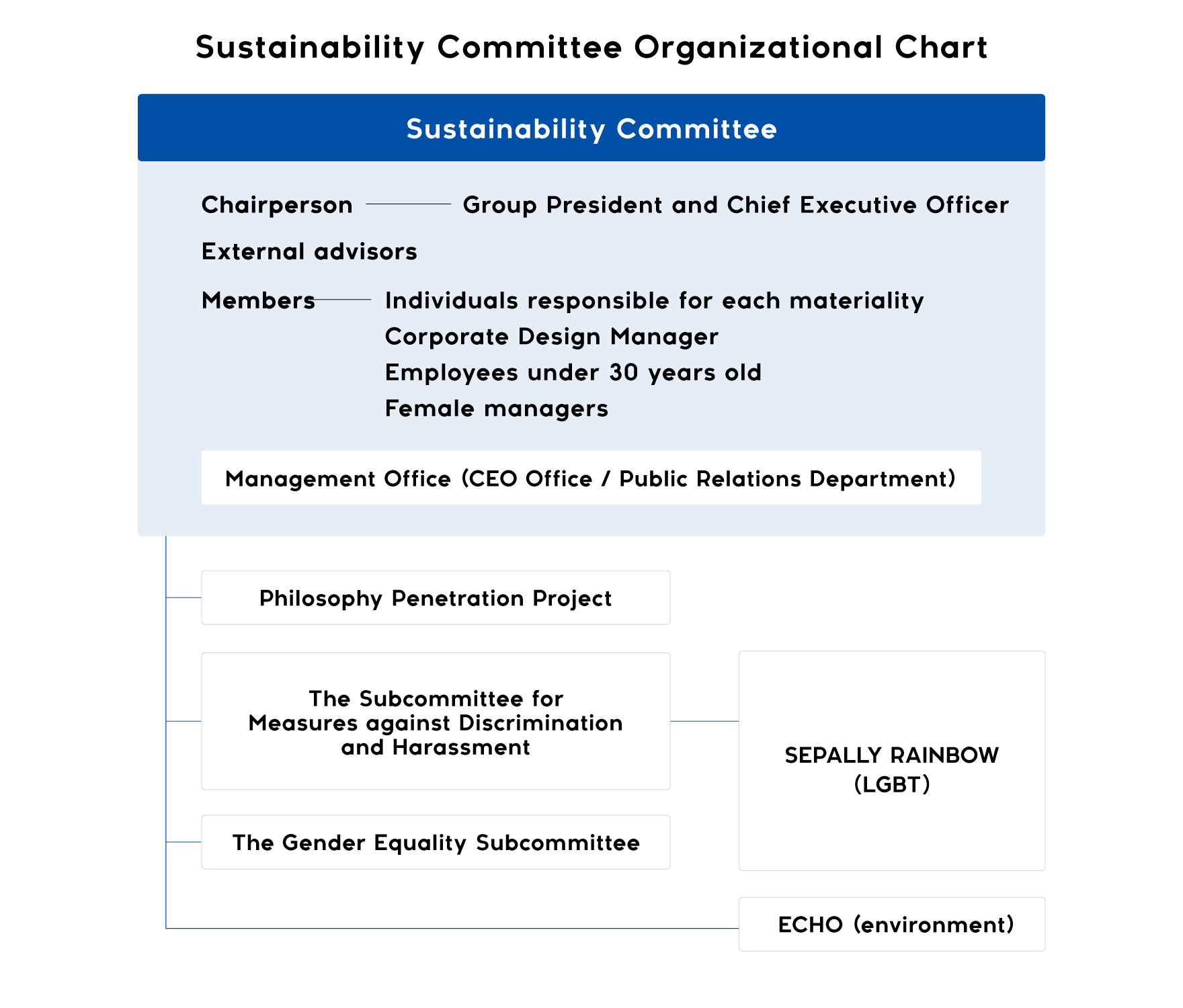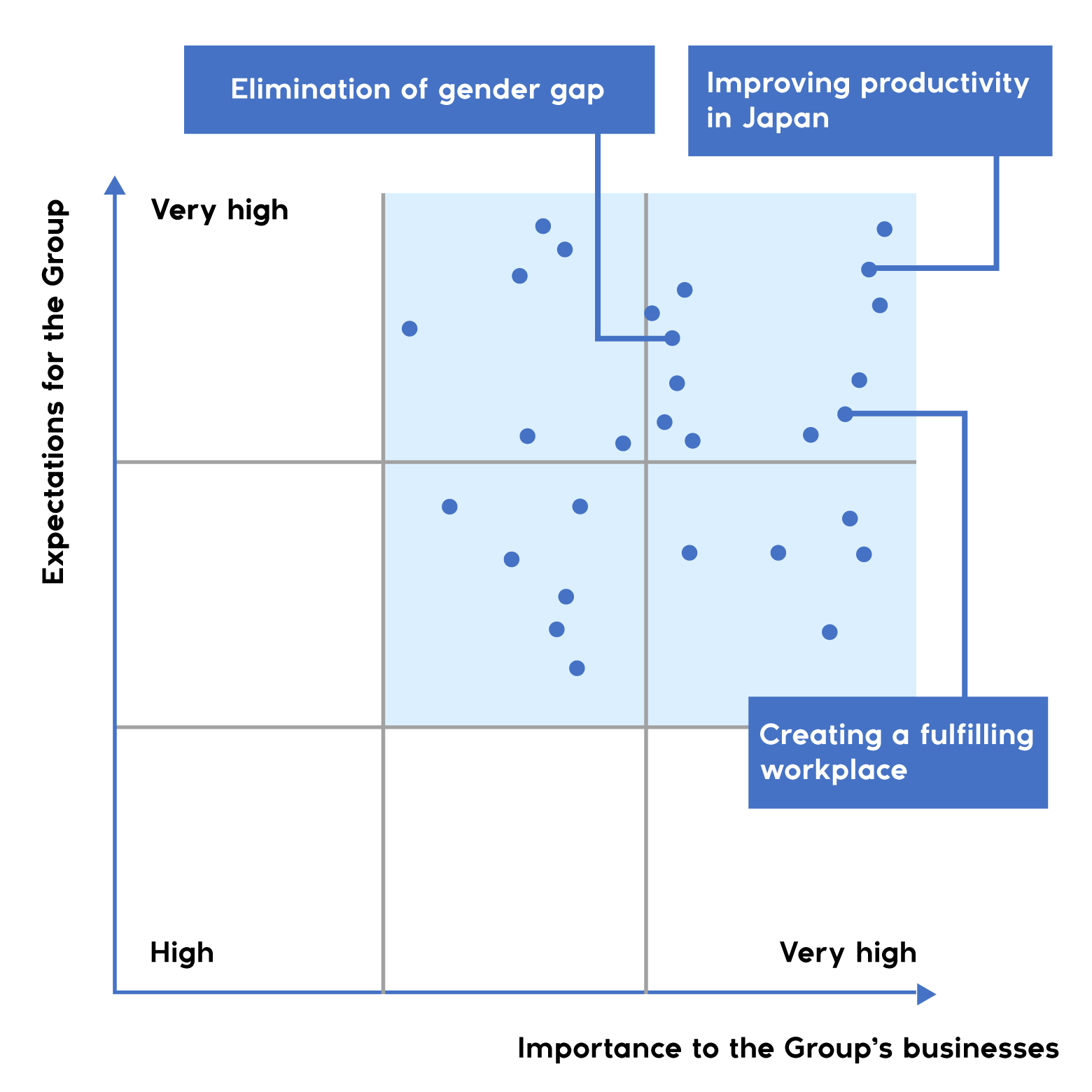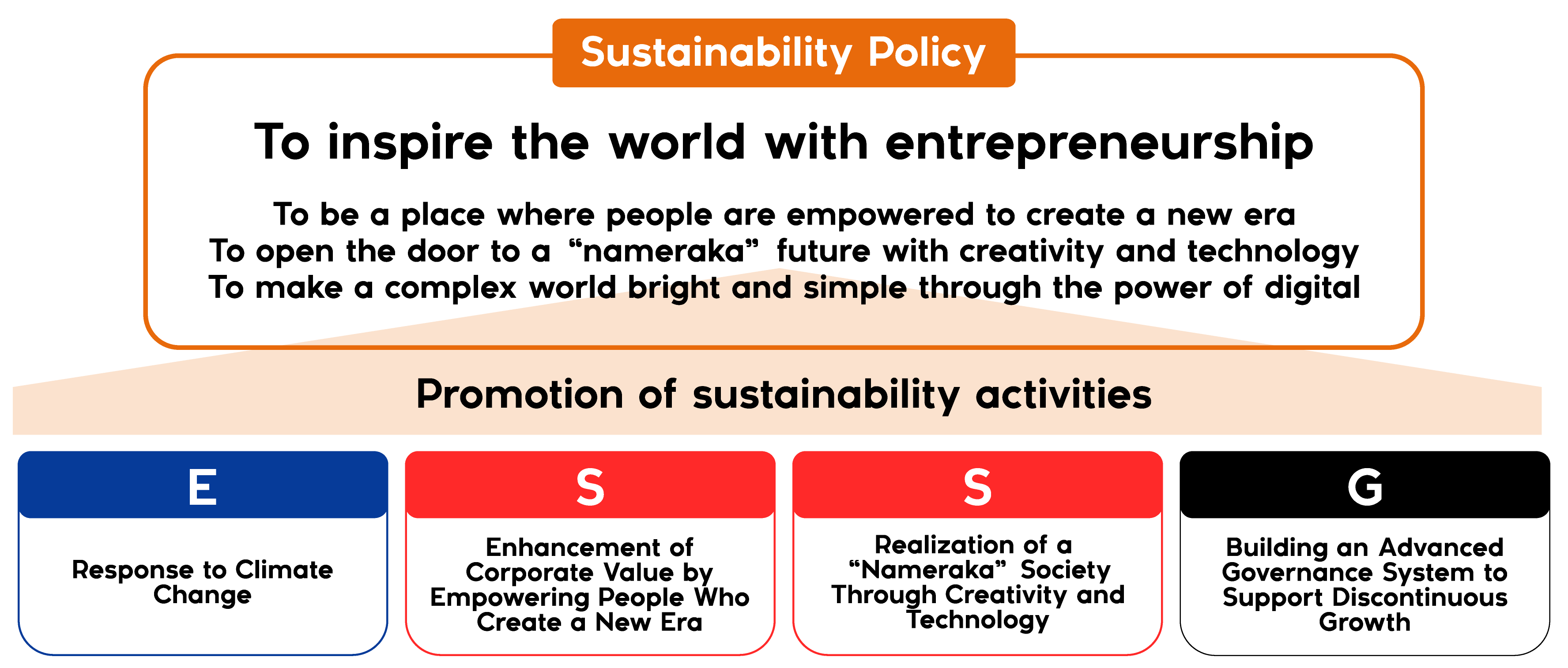Sustainability Policy and Materiality
Sustainability Policy
Companies can only operate in a sustainable and healthy society. A globalized, diversified and complex society has many challenges, and the various impacts of these challenges cannot be considered separately from corporate activities. We believe that in order to continue our corporate activities and develop sustainably with our stakeholders, it is imperative that we actively address these challenges and continue to contribute to their resolution.
We believe that contributing to the resolution of social issues through our corporate activities is what is required of us by our stakeholders in order to realize our mission of “To inspire the world with entrepreneurship” and our group vision, and we are promoting sustainability activities.
In our sustainability activities, we have set our group's mission and vision as our basic policy, and we are actively promoting activities with the aim of achieving sustainable growth of the group, improving corporate value, and realizing a sustainable society.
Sustainability Promotion Structure
We formed the Sustainability Committee in January 2022 as an update to the CSR Committee that was established in 2016. As a voluntary advisory body to support the decision-making of the Board of Directors, the Committee is actively working towards the sustainable growth of the Group, enhancing corporate value, and realizing a sustainable society.
The Sustainability Committee holds regular meetings every three months, where active discussions and considerations are particularly focused on sustainability activities and the setting of sustainability-related KPIs, as well as on the disclosure of non-financial information.
The Committee includes members such as employees under the age of 30 representing future generations, female managers, individuals responsible for each materiality, and external advisors, all contributing to vigorous discussions from various perspectives.
Furthermore, subcommittees have been established under the Committee to promote initiatives related to materiality within the Group, working towards solving issues and achieving KPIs.

Main Discussion Topics of the Sustainability Committee
The Sustainability Committee, led by the Group President and Chief Executive Officer (Chairperson), leverages the specialized knowledge of advisors and the diverse perspectives of participants, and mainly discusses the following topics:
| Main Discussion Topics | |
|---|---|
| 2022 | ・Overview of the Sustainability Committee ・Deliberation on the renewal of the Corporate philosophy ・Deliberation on the formulation of the Sustainability Policy ・Review and deliberation of priority themes (current materiality) and KPIs related to the priority themes ・Progress report on initiatives related to priority themes (current materiality) and various KPIs |
| 2023 | ・Report on the establishment of the Sustainability Policy ・Review and deliberation of priority themes (current materiality) and KPIs related to the priority themes ・Report on ESG evaluation results and deliberation on responses ・Report on the expansion of sustainability information disclosure (disclosure of information in accordance with TCFD recommendations and disclosure in the Securities Report) ・Report on activities to promote the new Corporate philosophy ・Progress report on initiatives related to materiality and various KPIs |
| 2024 | ・Report on changes to the committee structure ・Report on the revision of KPIs related to materiality ・Implementation of human rights training and deliberation on the formulation of the human rights policy ・Report on ESG evaluation results and deliberation on responses ・Report on activities to promote the Corporate philosophy and medium-term themes ・Progress report on initiatives related to materiality and various KPIs |
Materiality Identification Process
The Septeni Group has been promoting sustainability activities by regularly reviewing the materiality we identified in 2016. However, in response to the revision of our Group philosophy in October 2022, we have renewed our materiality.
In identifying the materiality, we extracted social issues mainly from international guidelines, and made a comprehensive judgment based on two axes: “expectations of stakeholders towards the Septeni Group” and “importance to the Septeni Group's business.” We identified 29 issues with particularly high priority, categorized them into four categories, and created a draft.
Based on the draft, we collected opinions several times at the Sustainability Committee, Group Management Meeting, and Board of Directors. The Sustainability Committee compiled the opinions from various places and created the final draft. At the Board of Directors, we confirmed the connection with Group's philosophy, including the revised vision, and the appropriateness as an important matter for the group.
By addressing the four materialities we have identified, we aim to achieve our group's vision and realize our mission of “To inspire the world with entrepreneurship.”
-
STEP 1
Identification of issues
Identified social issues based on SDGs, ISO26000, and other international standards
-
STEP 2
Confirmation of priority issues
We comprehensively assessed the identified social issues based on their importance to the Group's business and the expectations of stakeholders towards the Group, categorized them, and created a draft of materiality.
-
STEP 3
Collection of opinions at multiple meetings
Based on the draft, we conducted multiple rounds of opinion collection at the Sustainability Committee, Group Management Meeting, and Board of Directors.
-
STEP 4
Identification of Materiality
The collected opinions were compiled and the final draft was created at the Sustainability Committee. At the Board of Directors, we confirmed the connection with the Group's philosophy, including the vision, and the validity as an important matter for the Group.

| Materiality | Subcategory of Materiality | KPI | Target | Target Achievement Timing |
Relevance to corporate value |
|---|---|---|---|---|---|
| Enhancement of Corporate Value by Empowering People Who Create a New Era | Human resource development with reproducibility through digital HR | Operation and accuracy improvement of HR value chain*1 | Continuous implementation | Annually | ・Short-term performance improvement ・Mid- to long-term value creation |
| DEI (Diversity, Equity & Inclusion) | Ratio of female managers | 30% | 2030 | ・Mid- to long-term value creation | |
| Democratization of entrepreneurship | Cultivating an environment where employees can readily demonstrate entrepreneurship | Creating opportunities for employees to demonstrate entrepreneurship | 2025 | ・Short-term performance improvement ・Mid- to long-term value creation |
|
| Number of employee stock ownership plan participants | Year-on-year increase | Annually | |||
| Respect for Human Rights | Appropriate response to human rights risks | Establishing a human rights due diligence system | 2025 | ・Mitigation of management risks ・Mid- to long-term value creation |
|
| Realization of a “Nameraka” Society Through Creativity and Technology | Value creation leading to a “nameraka” society | Providing value and opportunities to society through business and services | Increase in recipients of value | 2030 | ・Short-term performance improvement ・Mid- to long-term value creation |
| Response to Climate Change | Reduction of GHG emissions and disclosure of information in accordance with TCFD recommendations | Scope 1 & 2 emissions | 70% reduction | 2030 | ・Mitigation of management risks ・Mid- to long-term value creation |
| Building an Advanced Governance System to Support Discontinuous Growth | Efforts for discontinuous growth | Fostering a healty cycle of business creation and exit through the consistent application of business continuity standards | Improving management indicators through business portfolio management | Annually | ・Short-term performance improvement ・Mid- to long-term value creation ・Mitigation of management risks |
| Efforts for risk reduction | Implementation of appropriate risk management and thorough compliance | 100% training participation rate | Annually | ・Mitigation of management risks | |
| Ensuring and improving the effectiveness of the board of directors | Continuous implementation of executive sessions Continuous implementation of effectiveness evaluations |
Annually | ・Mid- to long-term value creation ・Mitigation of management risks |
||
| Discussion of succession planning | Continuous implementation | Annually | ・Mid- to long-term value creation ・Mitigation of management risks |
- *1 HR strategy designed as a consistent service from recruitment to onboarding to development, based on a talent database accumulated over more than 20 years.
